江苏省新沂市第二中学高三英语 专题复习 Unit 2 Language学案(无答案)牛津译林版必修3
- 格式:doc
- 大小:284.00 KB
- 文档页数:16
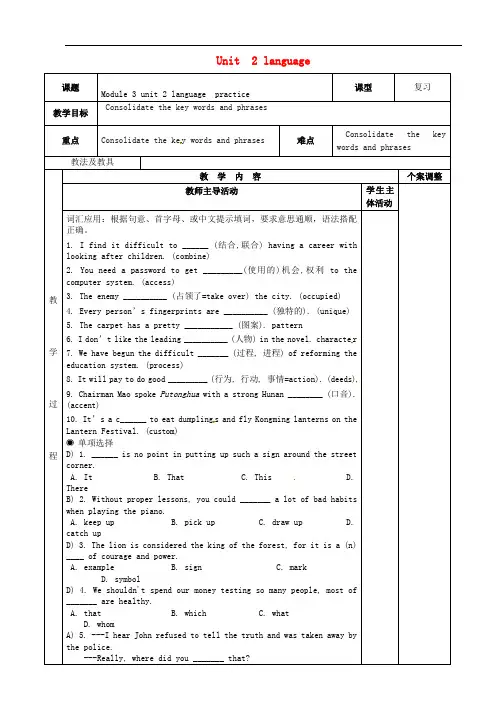
Unit 2 language课题Module 3 unit 2 language practice课型复习教学目标Consolidate the key words and phrases重点Consolidate the ke y words and phrases难点Consolidate the key words and phrases教法及教具教学过程教学内容个案调整教师主导活动学生主体活动词汇应用:根据句意、首字母、或中文提示填词,要求意思通顺,语法搭配正确。
1. I find it difficult to ______ (结合,联合) having a career withlooking after children. (combine)2. You need a password to get _________(使用的)机会,权利 to thecomputer system. (access)3. The enemy __________ (占领了=take over) the city. (occupied)4. Every person’s fingerprints are __________ (独特的). (unique)5. The carpet has a pretty ___________ (图案). pattern6. I don’t like the leading __________ (人物) in the novel. characte r7. We have begun the difficult _______ (过程, 进程) of reforming theeducation system. (process)8. It will pay to do good _________ (行为, 行动, 事情=action). (deeds)9. Chairman Mao spoke Putonghua with a strong Hunan ________ (口音).(accent)10. It’s a c______ to eat dumpling s and fly Kongming lanterns on theLantern Festival. (custom)单项选择D) 1. ______ is no point in putting up such a sign around the streetcorner.A. ItB. ThatC. ThisD.ThereB) 2. Without proper lessons, you could _______ a lot of bad habitswhen playing the piano.A. keep upB. pick upC. draw upD.catch upD) 3. The lion is considered the king of the forest, for it is a (n)____ of courage and power.A. exampleB. signC. markD. symbolD) 4. We shouldn't spend our money testing so many people, most of_______ are healthy.A. thatB. whichC. whatD. whomA) 5. ---I hear John refused to tell the truth and was taken away bythe police.---Really, where did you _______ that?A. pick upB. put upC. hear fromD. get upC) 6. His name was on the _______ of my tongue, but I simply couldn't remember it.A. endB. edgeC. tipD. sideB) 7. You have made a few spelling mistakes in your composition, but it is well written _______.A. on a wholeB. as a wholeC. general speakingD. as the wholeA) 8. --- How do you like _______ here so far. Mr. Fox?--- Well, I've really enjoyed meeting many nice people here and everything here is quite different.A. itB. themC. thatD. thisB) 9. Eating too much fat can _____ heart disease and cause high blood pressure.A. result fromB. contribute toC. attend toD. lead inC) 10. _______ the traditions of country music can be traced back over the centuries, the term "country" is a relatively modern invention.A. Now thatB. DespiteC. AlthoughD. As long asB) 11. The chairman thought ______ necessary to invite Professor Smith to speak at the meeting.A. thatB. itC. thisD. himC) 12. He is so lazy. That is _____ makes him so poor.A. whenB. whereC. whatD. whyD) 13. Everything has two sides. Beautiful songs, sometimes. ______ be just noise to others.A. mustB. mayC. shouldD. couldD) 14. Leaves are found on all kinds of trees, but they differ greatly _____ size and shape.A. onB. fromC. byD. in C) 15. ---If he works hard, he _______ to succeed in science.---Yes. He is _____ diligent than clever.A. hopes; much moreB. wishes; no moreC. promises; moreD. will be able; ratherA) 16. Mr. Wang was chosen to ______ our school at the meeting.A. representB. stand forC. on behalf ofD. take the place ofB) 17. There is no need to leave a tip. Service _____ in the bill.A. includesB. is includedC. is containedD. containsA) 18. There is a small group of words which even some native speakers and writers of English find ________.A. confusingB. confusedC. to confuseD. being confused完型填空We all know that language can sometimes get lost in translation. But do you know that some facial __1__ may also be __2__ incross-cultural situations?According to a study by Glasgow University, Europeans look __3__ a person's whole face __4_people from East Asia focus __5__ on the eyes. Researchers recorded the eye movements of 13 Westerners and 13 Easterners as they observed pictures of expressive faces. They were asked to __6__ the pictures into the following categories: happy, sad, surprised, fearful, disgusted, angry, or neutral.The team found East Asians focus much more attention on the eyes and also make a __7__ number of mistakes. Different from Europeans, they __8__ to have a more difficult time __9__ the difference between a face that looks fearful as opposed to surprised, and disgusted as opposed to angry."Westerners look at the eyes and the mouth __10__, whereas Easterners __11__ the eyes and neglect the mouth," said researcher Rachael Jack. "This means that Easterners have __12__ in telling apart facial expressions that look similar around the eye region."Jack said that the differences in eye movement reflected a cultural __13__ in the way people use their faces to express themselves. Easterners use the eyes more and the mouth __14__.The difference in the use of text message "emoticons" (表情符号) __15__ the idea. Easterners use the eyes to __16__ emotion, for example "^-^" for happy and "┬_┬" for sad. Westerners,__17__, use the mouth, for example ":-)" for happy and ":-(" for sad.The researchers said their results showed communication between people is much more __18__ than previously thought. When it __19__ communicating emotions across cultures, Easterners and Westerners can find themselves __20__ in translation.A) 1. A. expressions B. appearances C. featuresD. differencesB) 2. A. interesting B. confusing C. outstandingD. surprisingA) 3. A. across B. at C. onD. intoC) 4. A. when B. as C. whileD. ifB) 5. A. really B. mainly C. slightlyD. nearlyD) 6. A. make B. turn C. getD. putD) 7. A. small B. big C. fewerD. largerC) 8. A. need B. attempt C. tendD. intendB) 9. A. saying B. telling C. knowingD. judgingB) 10. A. in a different way B. in equal measureC. in turnsD. alternativelyA) 11. A. favor B. approve C. useD. focusA) 12. A. difficulty B. ability C. possibility D. certaintyB) 13. A. interest B. gap C. similarityD. concernC) 14. A. little B. least C. lessD. moreA) 15. A. supports B. opposes C. rejectsD. countsC) 16. A. make B. create C. convey D. proveB) 17. A. therefore B. however C. althoughD. moreoverD) 18. A. separated B. related C. expectedD. complicatedA) 19. A. comes to B. talks about C. turns toD. gets toB) 20. A. puzzling B. lost C. missingD. upset阅读理解:2011年北京卷C篇Students and Technology in the ClassroomI love my blackberry—it’s my little connection to the larger world that can go anywhere with me. I also love my laptop computer, as it holds all of my writing and thoughts. Despite this love of technology, I know that there are times when I need to move away from these devices(设备) and truly communicate with others.On occasion, I teach a course called History Matters for a group of higher education managers. My goals for the class include a full discussion of historical themes and ideas. Because I want students to thoroughly study the material and exchange their ideas with each other in the classroom, I have a rule —no laptop, iPads, phones, etc. When students were told my rule in advance of the class, some of them were not happy.Most students assume that my reasons for this rule include unpleasant experiences in the past with students misusing technology. There’s a bit of truth to that. Some students assume that I amanti-technology. There’s no truth in that at all. I love technology and try to keep up with it so I can relate to my students.The real reason why I ask students to leave technology at the door is that I think there are very few places i n which we can have deep conversions and truly engage complex ideas. Interruptions by technology often break concentration and allow for too much dependence on outside information for ideas. I want students to dig deep within themselves for inspiration and ideas. I want them to push each other to think differently and make connections between the course, the material and the class discussion.I’ve been teaching my history class in this way for many years and the evaluations reflect student satisfaction with the environment tha t I create .Students realize that with deep conversation and challenge , they learn at a level that helps them keep the course material beyond the classroom .I’m not saying that I won’t ever change my mind about technologyuse in my history class, but until I hear a really good reason for the change ,I’m sticking to my plan. A few hours of technology-free dialogue is just too sweet to give up.D) 63. Some of the students in the history class were unhappy with____ A. the course material B. others’ misuse of technology C. discussion topics D. the author’s class regulationsA) 64. T he underlined word “engage ” in para.4 probably means ____ A. explore B. accept C. change D. rejectA) 65. According to the author, the use of technology in the classroom may ____A. keep students from doing independent thinkingB. encourage students to have in-depth conversationsC. help students to better understand complex themesD. affect students’ concentration on course evaluationD) 66. It can be inferred from the last paragraph that the author ____ A. is quite stubborn B. will give up teaching historyC. will change his teaching plan soonD. values technology-free dialogues in his class任务型阅读Tim is a scientist. He studies how different insects and animals communicate with each other. Read the notes he has prepared for today’s speech.Good afternoon. Today's speech is about language—but not language as we know it. It's a different type of language—a way of communicating that most people probably have not even noticed. This is the language of bees, the way they talk to each other.Scientists have studied the society bees live in for many years and know that bees have a well-developed language that is different from those of other animals. This was first discovered in the 1920s by an Austrian named Karl von Frisch, who found that bees pass important messages to each other about where to find food.How do they do it? You may ask. A searcher bee goes out looking for new food supplies. She returns home and gives her information to the worker bees there. The major way that bees communicate is by touch. This is how bees can tell which type of flower the searcher bee has found. The searcher bee then does a dance to give the worker bees more information. There are two types of dance that tell about food: the 'waggle' dance and the 'circle' dance.The searcher bee will perform the waggle dance if the food supply is far away from home. In this dance, the searcher bee moves in a small figure of 8 pattern. She waggles her stomach. The number of waggles she does and how long she dances tell the worker bees how far away the food supply is. The way she does the dance tells the worker bees how good the food is. The way she does the figure of 8 pattern also tells the other bees where the sun is in the sky. The worker bees then fly to the food supply using all this information.The searcher bee does the circle dance when the food supply is closeto the home. In this dance, she moves in small circles, which tells the worker bees that the food is very near. However, the circle dance does not give them any directions. It is amazing that the clever bees still know where to find the food.Fill in the form below using the information from the notes above.Discover Karl von Frisch, an 1. _____________Language of bees Well-developed and 2. _______ from those of othWays that bees ‘talk’ with each other By touch 3. _______ way that bees communicate4. ____dance (when the food is far away) The5. ______ of waggles and the length of the how far away the food is; the way the dance is how6. _____ the food is.The way she does the figure of 8 tells where th is.8. ____ dance (when the food is close) The bee moves in small 9. _______.The dance tells that food is very near, but doe 10. ______.1. Austrian2. different3. Major4. Waggle5. number6. good7. sun8. Circle9. circles 10. directions板书设计(用案人完成)当堂作业课外作业教学札记。
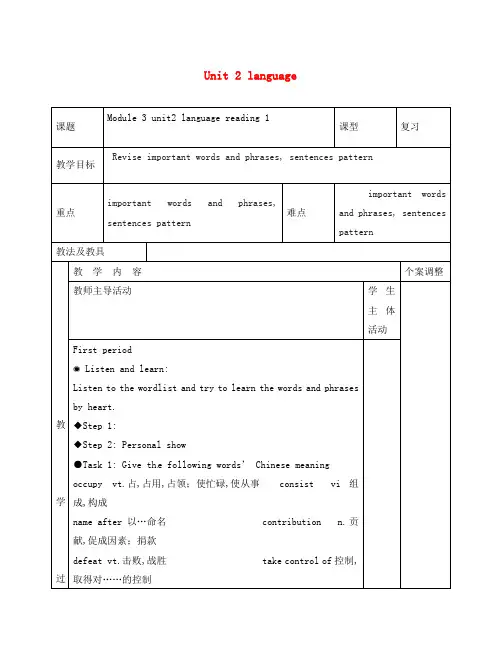
Unit 2 language课题Module 3 unit2 language reading 1课型复习教学目标Revise important words and phrases, sentences pattern重点important words and phrases,sentences pattern难点important wordsand phrases, sentencespattern教法及教具教学过教学内容个案调整教师主导活动学生主体活动First periodListen and learn:Listen to the wordlist and try to learn the words and phrasesby heart.◆Step 1:◆Step 2: Personal show●Task 1: Give the following words’ Chinese meaningoccupy vt.占,占用,占领;使忙碌,使从事consist vi组成,构成name after 以…命名contribution n.贡献,促成因素;捐款defeat vt.击败,战胜take control of控制,取得对……的控制程lead to 导致replace vt替换,代替,取代raise vt.养育,培养,举起,增加,提高,筹募,提及embarrass vt.使难堪,使尴尬concern n.关切;忧虑vt.涉及;使…担心,对…感兴趣differ from和…不同,不同于stand for 代表,象征appearance n. 出现;外观,外貌simplify νt. 简化as a whole 作为整体,总体上shortcoming n.短处,缺点version n.版本●Task 2: Translate the following wordsn. 过程;进程process n.差别;区别distinctionadj. 纯的,纯洁的,纯粹的pure a. 独特的;极不寻常的 uniquevt. 进入,使用n. 通道, (使用的)机会,权利access a.温柔的;平和的gentlen. (书写或印刷)文字,角色;符号,性格 character n.结论,推论conclusionn.习惯,风俗,惯例custom adj. 错误的,误解的mistakenvt.代表;展示,描绘represent νt. & νi.组合, (使)联合combinevt. 显示,表示,象征,暗示indicate a. 方便的convenienta.实用的;(切实)可行的practical ad.因此,所以thereforeStep 3: Text reading Listen to the text and then finish the following sentences●Task 1: Fill in the blanks according to the text1. That is why English has so many difficult rules _________(让人迷惑的). (that confuse people)2. Old English __________ (包含) a mixture of their la nguages. (consisted of / was made up of)3. _________ (除了) place names such as London, very few Celtic words __________ (成为的部分) Old English. (Aside from; became part of)4. When we speak English today, we sometimes _____________ (感到迷惑) which words or phrases to use.(feel puzzled about)5. Many things _______ (起到作用) the development of this new type of English. (played a part in)6. ________(尽管) the Normans spoke French for the entire 250 years they ruled England, French did not ______ English ______ (取代…作为) the first language. (Even though; replace; as)7. Old French _____ other ________(对产生了促进作用) Middle English as well. (made; contributions to)8. __________ (可以肯定的是) that this process will continue, and people will keep inventing new words and new ways of saying things. (It is certain)Task 2: Task-ba sed reading阅读课文, 完成下表。
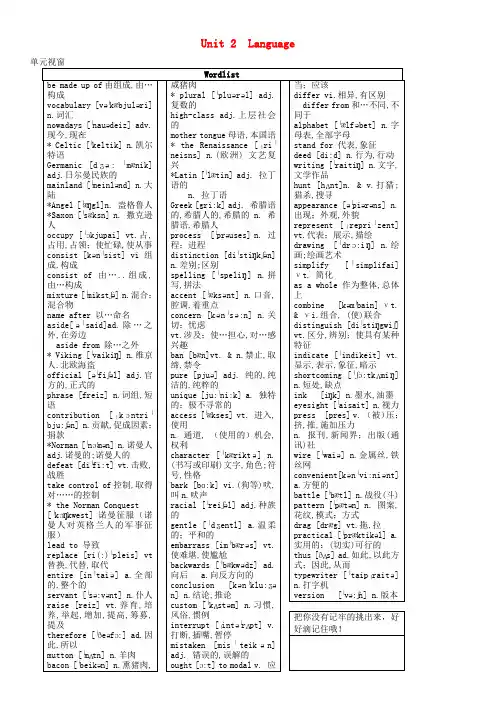
Unit 2 LanguageEnglish and its history Focus All through history, people from many different countries andcultures have lived together in Britain. The English language is madeup of the grammar and vocabulary these people brought to Britain. Thatis why English has so many difficult rules that confuse people.Old EnglishOld English is very different from the English we speak nowadays.In fact, we would not be able to understand it if we heard it today.Before the middle of the 5th century, people in Britain all spoke alanguage called Celtic. Then two Germanic groups from the European mainland—the Angles and the Saxons—occupied Britain. Old English consisted of a mixture of their languages. (Both the English language and the English people are named after the Angles; the word Angle was spelt Engle in Old English.) Aside from place names such as London, very few Celtic words became part of Old English. At the end of the 9th century, the Vikings, people from Northern European countries such as Denmark and Norway, began to move to Britain. They brought with them their languages, which also mixed with Old English. By the 10th century, Old English had become the official language of England.When we speak English today, we sometimes feel puzzled about which words or phrases to use. This is because English has many words and phrases from different languages, but with similar meanings. For example, the word sick came from a word once used by the Angles and the Saxons, while ill came from a word once used by the Norwegians.Middle EnglishMiddle English is the name given to the English used from around the 12th to the 15th centuries. Many things played a part in the development of this new type of English. The most important contribution was from the Normans, a French-speaking peop le who defeated England and took control of the country in 1066. However, the Norman Conquest did not affect English as much as the Angles and the Saxons' victory about 600 years earlier, which led to Old English replacing Celtic. Even though the Normans spoke French for the entire 250 years they ruled England, French did not replace English as the first language. On the other hand, the English language did borrow many words from French. This resulted in even more words with similar meanings, such as answer (from Old English) and reply (from Old French). It is interesting to learn how the words for animals and meat developed. After the Norman Conquest, many English people worked as servants who raised animals. Therefore, the words we use for most animals raised for food, such as cow, sheep and pig, came from Old English. However, the words for the meat of these animals, which was served to the Normans, came from Old French: beef, mutton, pork and bacon.Old French made other contributions to Middle English as well. In Old English, the Germanic way of making words plural was used. For example, they said housen instead of houses, and shoen instead of shoes. After the Normans took control, they began using the French way of making 1. occupy2. consist3. contributi onplurals, adding an -s to house and shoe. Only a few words kept theirGermanic plural forms, such as man/ men and child/ children.After the Norman Conquest, high-class people spoke French whilecommon people spoke English. However, by the latter half of the 14thcentury, English had come into widespread use among all classes inEngland. In 1399, Henry IV became King of England. His mother tonguewas English, and he used English for all official events.Modern EnglishModern English appeared during the Renaissance in the 16th century.Because of this, Modern English includes many Latin and Greek words.Pronunciation also went through huge changes during this period. Ofcourse, this was not the end of the changes in the English language.The question of whether English will keep on changing in the future iseasy to answer. It is certain that this process will continue, and peoplewill keep inventing new words and new ways of saying things.First periodListen and learn:Listen to the wordlist and try to learn the words and phrases by heart.◆Step 1:◆Step 2: Personal show●Task 1: Give the following words’ Chinese meaningoccupy vt. consist viname after contribution n.defeat vt. take control oflead to replace vtraise vt. embarrass vt.concern n. vt. differ fromstand for appearance n.simplify νt.as a wholeshortcoming n. version n.●Task 2: Translate the following wordsn. 过程;进程n.差别;区别adj. 纯的,纯洁的,纯粹的 a. 独特的;极不寻常的vt. 进入,使用n. 通道, (使用的)机会,权利 a.温柔的;平和的n. (书写或印刷)文字,角色;符号,性格n.结论,推论n.习惯,风俗,惯例adj. 错误的,误解的vt.代表;展示,描绘νt. & νi.组合, (使)联合vt. 显示,表示,象征,暗示 a. 方便的a.实用的;(切实)可行的ad.因此,所以Step 3: Text reading Listen to the text and then finish the following sentences●Task 1: Fill in the blanks according to the text1. That is why English has so many difficult rules _________(让人迷惑的).2. Old English __________ (包含) a mixture of their languages.3. _________ (除了) place names such as London, very few Celtic words __________ (成为的部分) Old English.4. When we speak English today, we sometimes _____________ (感到迷惑) which words or phrases to use.5. Many things _______ (起到作用) the development of this new type of English.6. ________(尽管) the Normans spoke French for the entire 250 years they ruled England, French didnot ______ English ______ (取代…作为) the first language.7. Old French _____ other ________(对产生了促进作用) Middle English as well.8. __________ (可以肯定的是) that this process will continue, and people will keep inventing new words and new ways of saying things.Periods Time Relevant 1. _______Old EnglishBefore the middle of the5th centuryPeople in Britain all spoke a languagecalled CelticAt the end of the 9thcenturyAs the Vikings invaded Britain andbrought their languages, old English was3. _____.By the 10th centuryOld English was the official language ofEngland. The language was 4. ____up of anAnglo-Saxon base plus words from thelanguages of Denmark and Norway.MiddleEnglishIn 1066The Normans conquered England and5.______ the country.During 250 years French had an 6. ______ on English.By the latter half of the14th centuryEnglish was 7. ____ by all classes inEngland.In 1399Henry IV used English for all official 8._____.ModernEnglishDuring the Renaissancein the 16th centuryPronunciation 9. _____ huge changes.2. ______People will keep inventing new words andnew ways of 10. ______ things1. Read the text2. Try to recite the sentences in step 3-Task 1Second periodStep 1: Personal showWrite down the words according to the definition1. difficult to understand; puzzling2. be made up of3. cause something to exist4. take the place of5. make (sth) easy to do or understand; make simple6. live in or have possession of7. help to cause sth8. difference or contrast between one person or thing and another9. join or mix together to form a whole10. show sth, especially by pointing11. fitting in well with people's needs or plans;giving no trouble or difficulty; suitable12. suitable for the purpose for which it was made; usefulStep 2: Language focus1. occupy vt.占据,充满(时间,空间,某人的头脑等);(军事)占领(国家,阵地等);占用;占有(房屋,土地等) 知识探究:His speech occupied only 3 minutes. 他的演讲仅占用了三分钟。
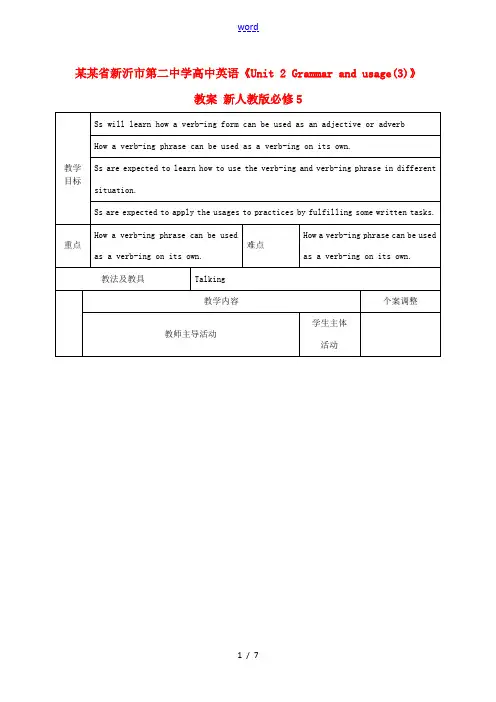
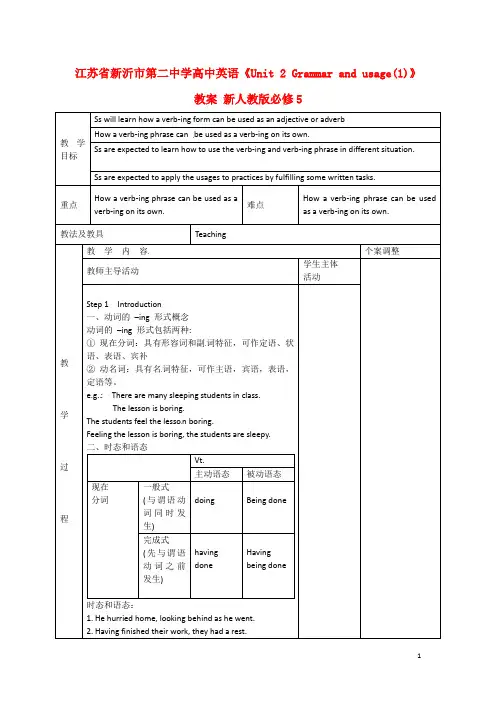
江苏省新沂市第二中学高中英语《Unit 2 Grammar and usage(1)》教案新人教版必修5教学目标Ss will learn how a verb-ing form can be used as an adjective or adverbHow a verb-ing phrase can be used as a verb-ing on its own.Ss are expected to learn how to use the verb-ing and verb-ing phrase in different situation. Ss are expected to apply the usages to practices by fulfilling some written tasks.重点How a verb-ing phrase can be used as averb-ing on its own.难点How a verb-ing phrase can be usedas a verb-ing on its own.教法及教具Teaching教学过程教学内容个案调整教师主导活动学生主体活动Step 1 Introduction一、动词的–ing 形式概念动词的–ing 形式包括两种:①现在分词:具有形容词和副词特征,可作定语、状语、表语、宾补②动名词:具有名词特征,可作主语,宾语,表语,定语等。
e.g.: There are many sleeping students in class.The lesson is boring.The students feel the lesso n boring.Feeling the lesson is boring, the students are sleepy.二、时态和语态Vt.主动语态被动语态现在分词一般式(与谓语动词同时发生)doing Being done完成式(先与谓语动词之前发生)havingdoneHavingbeing done时态和语态:1. He hurried home, looking behind as he went.2. Having finished their work, they had a rest.3. The large building being built is a library.4. Having been shown the lab, we were taken to see the library.三、现在分词的语法功能1.Attributee.g.: 1. a running man2. The man running in the pi cture is Liu Xiang.= The man who is running in the picture is Liu Xiang.小结:1. V-ing形式作定语可表示主语所作动作正在进行或表示和所修饰词之间有逻辑主动关系。
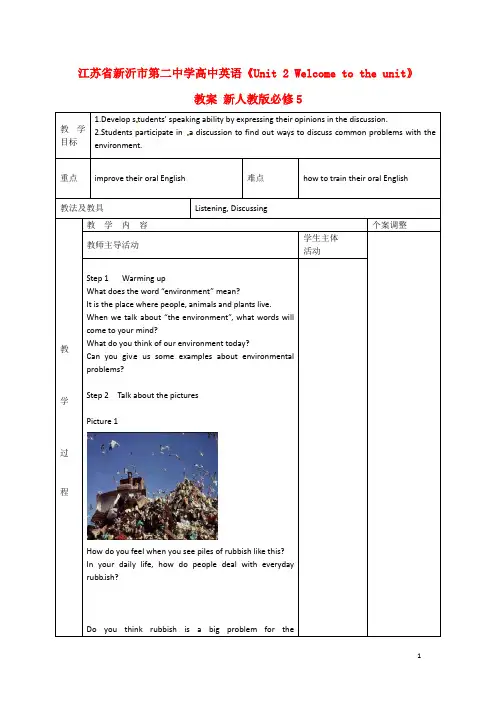
江苏省新沂市第二中学高中英语《Unit 2 Welcome to the unit》教案新人教版必修5教学目标1.Develop s tudents’ speaking ability by expressing their opinions in the discussion.2.Students participate in a discussion to find out ways to discuss common problems with the environment.重点improve their oral English 难点how to train their oral English 教法及教具Listening, Discussing教学过程教学内容个案调整教师主导活动学生主体活动Step 1 Warming upWhat does the word “environment” mean?It is the place where people, animals and plants live.When we talk about “the environment”, what words willcome to your mind?What do you think of our environment today?Can you give us some examples about environmentalproblems?Step 2 Talk about the picturesPicture 1How do you feel when you see piles of rubbish like this?In your daily life, how do people deal with everydayrubb ish?Do you think rubbish is a big problem for theenvironment?Picture 2Suppose you live next to the factory, how do you think the smo ke will affect you?Compared to the economic benefits a factory can bring to you, how important is environmental protection? Why?Picture 3What can you see in the picture?Why do people chop down so many trees every year? What can human and the environment benefit from trees?What will happen if we continue ch opping down so many trees?What can we do to prevent this from happening?Picture 4It is reported that every year the losses caus ed by forest fires amount to millions of dollars. In your opinion, whatmight be the reasons for the terrible forest fire in the pictur e?Do you think the forest plays an important part in balancing nature?Step 3 DiscussionLook at the pictures above and discuss which probl ems are caused by nature and which ones are caused by man. Can you think of other nature disasters that damage the environment?Can you think of other ways in which people damage the environment?Step 4 Further discussionWhy do we have so many different kinds of environmental problems?Are t hey caused by nature or by human beings ourselves?What should we do now to protect the environment?From now on, we should do all we could to protect our world not to be hurt. We should save even a penny or a drop of water to protect our sources being wasted. We should not spit and litter to keep our environment clean, and we should not waste a chance to protect ourselves.Step 5 HomeworkWrite a short passage about the environmental problemsall the people in our city are facing now analyze thecauses and give some possible suggestions to improve theenvironment.板书设计教学札记。
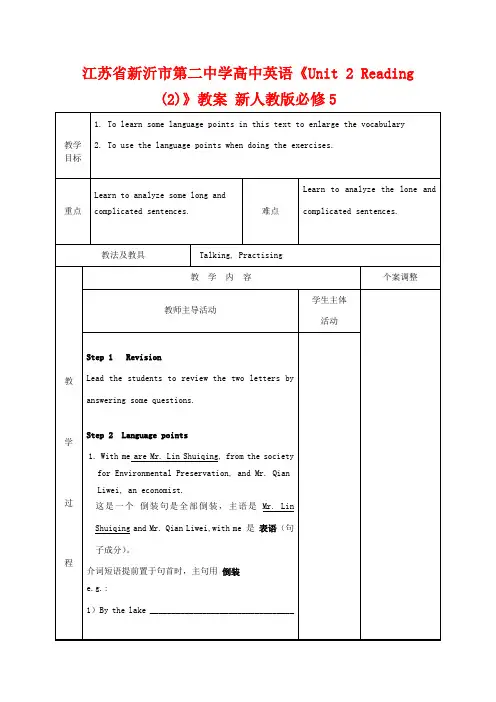
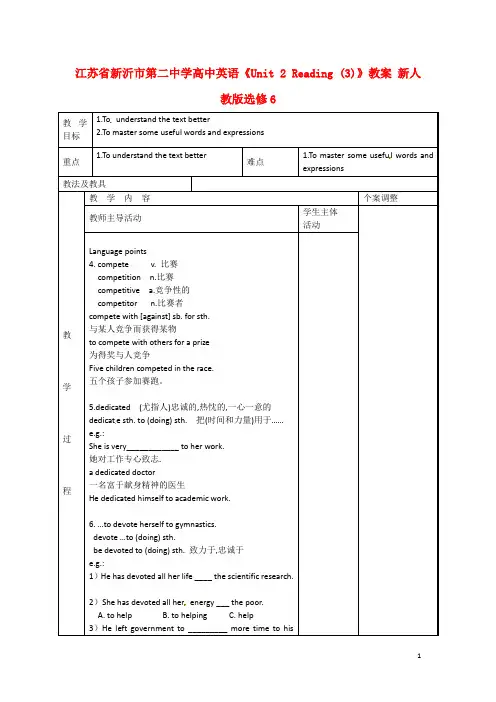
江苏省新沂市第二中学高中英语《Unit 2 Reading (3)》教案新人教版选修6教学目标1.To understand the text better2.To master some useful words and expressions重点1.To understand the text better难点1.To master some usefu l words andexpressions教法及教具教学过程教学内容个案调整教师主导活动学生主体活动Language points4. compete v. 比赛competition n.比赛competitive a.竞争性的competitor n.比赛者compete with [against] sb. for sth.与某人竞争而获得某物to compete with others for a prize为得奖与人竞争Five children competed in the race.五个孩子参加赛跑。
5.dedicated (尤指人)忠诚的,热忱的,一心一意的dedicat e sth. to (doing) sth. 把(时间和力量)用于……e.g.:She is very____________ to her work.她对工作专心致志.a dedicated doctor一名富于献身精神的医生He dedicated himself to academic work.6. …to devote herself to gymnast ics.devote …to (doing) sth.be devoted to (doing) sth. 致力于,忠诚于e.g.:1)He has devoted all her life ____ the scientific research.2)She has devoted all her energy ___ the poor.A. to helpB. to helpingC. help3)He left government to _________ more time to hisfamily.4)Everybody knows that our manager is very_________ to his wife.a devoted friend 忠实的朋友e.g.: She is devoted to her son.devotion n.devotion to the cause of education对教育事业的热爱[忠诚]devotion to duty忠于职守the devotion of one's time to scientific research把时间用于科研7.rushrush vt. 急送;猛推rush sb. to the hospital 火速送某人去医院e.g.:Ambulances rushed the injured to the hospital.She was __________ to a top hospital in New York.The injured ______________the hospital.n. 急速in a rush 匆忙地;e.g.:The injured were sent to the hospital ______ _____ _____.8.in good/high spiritsin low/poor spiritskeep up one’s spiritsraise one’s spirits 提起精神lose one’s spirits 垂头丧气e.g.:Dad’s in high _____today, isn’t he?9.And how has Sang Lan adapted to her new life.adapt (onself) to +n.适应e.g.:We should adapt our thinking to the new conditions.It took me quite a while to _______ myself to the newsurroundings.改编;改装e.g.:Davies is busy _________ his latest novel for television. The play had been_________ for (= changed to make it suitable for) children10. meeting a goal1)目的,目标achieve/reach/realize one’s goal实现目标;2)(球戏等的)得分,赢分make/score/get a goal 得一分11.remain “仍是;保持”后接形容词、名词、介词短语等作表语。
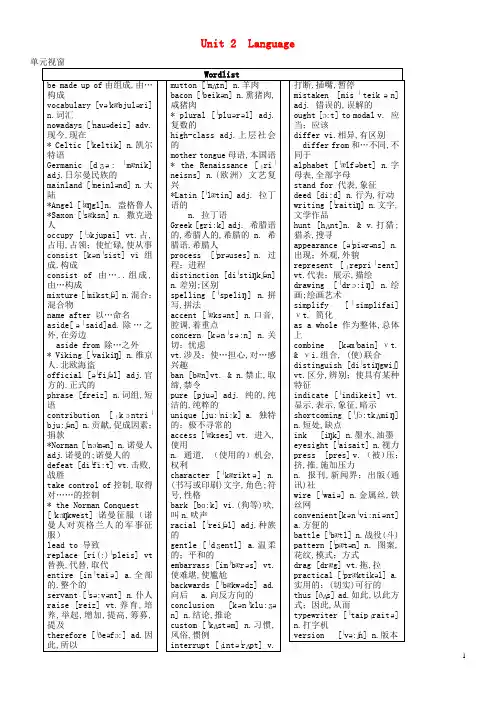
Unit 2 Language单元视窗Wordlistbe made up of由组成,由…构成vocabulary [vəˈkæbjuləri] n.词汇nowadays [ˈnauədeiz] adv.现今,现在* Celtic [ˈkeltik] n.凯尔特语Germanic [dʒə: ˈmænik] adj.日尔曼民族的mainland [ˈmeinlənd] n.大陆*Angel [ˈæŋgl]n. 盎格鲁人*Saxon [ˈsæksn] n. 撒克逊人occupy [ˈɔkjupai] vt.占,占用,占领;使忙碌,使从事consist [kənˈsist] vi组成,构成consist of由…..组成,由…构成mixture [ˈmikstʃə] n.混合;混合物name after 以…命名aside[əˈsaid]ad.除…之外,在旁边aside from 除…之外* Viking [ˈvaikiŋ] n.维京人.北欧海盗official [əˈfiʃəl] adj.官方的,正式的phrase [freiz] n.词组,短语contribution [ˌkɔntriˈbju:ʃən] n.贡献,促成因素;捐款*Norman [ˈnɔːmən] n.诺曼人adj.诺曼的;诺曼人的defeat [diˈfi:t] vt.击败,战胜take control of控制,取得对……的控制* the Norman Conquest [ˈkɔŋkwest] 诺曼征服(诺曼人对英格兰人的军事征服)lead to 导致replace [ri(:)ˈpleis] vt 替换,代替,取代entire [inˈtaiə] a.全部的,整个的servant [ˈsə:vənt] n.仆人raise [reiz] vt.养育,培养,举起,增加,提高,筹募,提及therefore [ˈðeəfɔ:] ad.因此,所以mutton [ˈmʌtn] n.羊肉bacon [ˈbeikən] n.熏猪肉,咸猪肉* plural [ˈpluərəl] adj.复数的high-class adj.上层社会的mother tongue母语,本国语* the Renaissance [ˌriˈneisns] n.(欧洲) 文艺复兴*Latin [ˈlætin] adj. 拉丁语的n. 拉丁语Greek [gri:k] adj. 希腊语的,希腊人的,希腊的n. 希腊语,希腊人process [ˈprəuses] n. 过程;进程distinction [diˈstiŋkʃən]n.差别;区别spelling [ˈspeliŋ] n.拼写,拼法accent [ˈæksənt] n.口音,腔调,着重点concern [kənˈsə:n] n.关切;忧虑vt.涉及;使…担心,对…感兴趣ban [bæn]vt. & n.禁止,取缔,禁令pure [pjuə] adj. 纯的,纯洁的,纯粹的unique [ju:ˈni:k] a. 独特的;极不寻常的access [ˈækses] vt. 进入,使用n. 通道, (使用的)机会,权利character [ˈkæriktə] n.(书写或印刷)文字,角色;符号,性格bark [bɑ:k] vi.(狗等)吠,叫n.吠声racial [ˈreiʃəl] adj.种族的gentle [ˈdʒentl] a.温柔的;平和的embarrass [imˈbærəs] vt.使难堪,使尴尬backwards [ˈbækwədz] ad.向后 a.向反方向的conclusion [kənˈklu:ʒən] n.结论,推论custom [ˈkʌstəm] n.习惯,风俗,惯例interrupt [ˌintəˈrʌpt] v.打断,插嘴,暂停mistaken [misˈteikən]adj. 错误的,误解的ought [ɔ:t] to modal v. 应当;应该differ vi.相异,有区别differ from和…不同,不同于alphabet [ˈælfəbet] n.字母表,全部字母stand for 代表,象征deed [di:d] n.行为,行动writing [ˈraitiŋ] n.文字,文学作品hunt [hʌnt]n. & v.打猎;猎杀,搜寻appearance [əˈpiərəns] n.出现;外观,外貌represent [ˌrepriˈzent]vt.代表;展示,描绘drawing [ˈdrɔ:iŋ] n.绘画;绘画艺术simplify [ˈsimplifai]νt. 简化as a whole 作为整体,总体上combine [kəmˈbain] νt.& νi.组合, (使)联合distinguish [diˈstiŋgwiʃ]vt.区分,辨别;使具有某种特征indicate [ˈindikeit] vt.显示,表示,象征,暗示shortcoming [ˈʃɔ:tkʌmiŋ]n.短处,缺点ink [iŋk] n.墨水,油墨eyesight [ˈaisait] n.视力press [pres] v. (被)压;挤,推,施加压力n. 报刊,新闻界;出版(通讯)社wire [ˈwaiə] n.金属丝,铁丝网convenient[kənˈvi:niənt]a.方便的battle [ˈbætl] n.战役(斗)pattern [ˈpætən] n. 图案,花纹,模式;方式drag [dræg] vt.拖,拉practical [ˈpræktikəl] a.实用的;(切实)可行的thus [ðʌs] ad.如此,以此方式;因此,从而typewriter [ˈtaipˌraitə]n.打字机version [ˈvə:ʃn] n.版本把你没有记牢的挑出来,好好滴记住哦!English and its history Focus All through history, people from many different countries andcultures have lived together in Britain. The English language is madeup of the grammar and vocabulary these people brought to Britain. Thatis why English has so many difficult rules that confuse people.Old EnglishOld English is very different from the English we speak nowadays.In fact, we would not be able to understand it if we heard it today.Before the middle of the 5th century, people in Britain all spoke alanguage called Celtic. Then two Germanic groups from the European mainland—the Angles and the Saxons—occupied Britain. Old English consisted of a mixture of their languages. (Both the English language and the English people are named after the Angles; the word Angle was spelt Engle in Old English.) Aside from place names such as London, very few Celtic words became part of Old English. At the end of the 9th century, the Vikings, people from Northern European countries such as Denmark and Norway, began to move to Britain. They brought with them their languages, which also mixed with Old English. By the 10th century, Old English had become the official language of England.When we speak English today, we sometimes feel puzzled about which words or phrases to use. This is because English has many words and phrases from different languages, but with similar meanings. For example, the word sick came from a word once used by the Angles and the Saxons, while ill came from a word once used by the Norwegians.Middle EnglishMiddle English is the name given to the English used from around the 12th to the 15th centuries. Many things played a part in the development of this new type of English. The most important contribution was from the Normans, a French-speaking peop le who defeated England and took control of the country in 1066. However, the Norman Conquest did not affect English as much as the Angles and the Saxons' victory about 600 years earlier, which led to Old English replacing Celtic. Even though the Normans spoke French for the entire 250 years they ruled England, French did not replace English as the first language. On the other hand, the English language did borrow many words from French. This resulted in even more words with similar meanings, such as answer (from Old English) and reply (from Old French). It is interesting to learn how the words for animals and meat developed. After the Norman Conquest, many English people worked as servants who raised animals. Therefore, the words we use for most animals raised for food, such as cow, sheep and pig, came from Old English. However, the words for the meat of these animals, which was served to the Normans, came from Old French: beef, mutton, pork and bacon.Old French made other contributions to Middle English as well. In Old English, the Germanic way of making words plural was used. For example, they said housen instead of houses, and shoen instead of shoes. After the Normans took control, they began using the French way of making 1. occupy2. consist3. contributi onplurals, adding an -s to house and shoe. Only a few words kept their Germanic plural forms, such as man/ men and child/ children.After the Norman Conquest, high-class people spoke French while common people spoke English. However, by the latter half of the 14th century, English had come into widespread use among all classes in England. In 1399, Henry IV became King of England. His mother tongue was English, and he used English for all official events.Modern EnglishModern English appeared during the Renaissance in the 16th century. Because of this, Modern English includes many Latin and Greek words. Pronunciation also went through huge changes during this period. Of course, this was not the end of the changes in the English language. The question of whether English will keep on changing in the future is easy to answer. It is certain that this process will continue, and people will keep inventing new words and new ways of saying things.First periodListen and learn:Listen to the wordlist and try to learn the words and phrases by heart.◆Step 1:◆Step 2: Personal show●Task 1: Give the following words’ Chinese meaningoccupy vt. consist viname after contribution n.defeat vt. take control oflead to replace vtraise vt. embarrass vt.concern n. vt. differ fromstand for appearance n.simplify νt. as a wholeshortcoming n. version n.●Task 2: Translate the following wordsn. 过程;进程n.差别;区别adj. 纯的,纯洁的,纯粹的 a. 独特的;极不寻常的vt. 进入,使用n. 通道, (使用的)机会,权利 a.温柔的;平和的n. (书写或印刷)文字,角色;符号,性格n.结论,推论n.习惯,风俗,惯例adj. 错误的,误解的vt.代表;展示,描绘νt. & νi.组合, (使)联合vt. 显示,表示,象征,暗示 a. 方便的a.实用的;(切实)可行的ad.因此,所以Step 3: Text reading Listen to the text and then finish the following sentences●Task 1: Fill in the blanks according to the text1. That is why English has so many difficult rules _________(让人迷惑的).2. Old English __________ (包含) a mixture of their languages.3. _________ (除了) place names such as London, very few Celtic words __________ (成为的部分) Old English.4. When we speak English today, we sometimes _____________ (感到迷惑) which words or phrases to use.5. Many things _______ (起到作用) the development of this new type of English.6. ________(尽管) the Normans spoke French for the entire 250 years they ruled England, French didnot ______ English ______ (取代…作为) the first language.7. Old French _____ other ________(对产生了促进作用) Middle English as well.8. __________ (可以肯定的是) that this process will continue, and people will keep inventing new words and new ways of saying things.1. Read the text2. Try to recite the sentences in step 3-Task 1Second periodStep 1: Personal showWrite down the words according to the definition1. difficult to understand; puzzling2. be made up of3. cause something to exist4. take the place of5. make (sth) easy to do or understand; make simple6. live in or have possession of7. help to cause sth8. difference or contrast between one person or thing and another9. join or mix together to form a whole10. show sth, especially by pointing11. fitting in well with people's needs or plans;giving no trouble or difficulty; suitable12. suitable for the purpose for which it was made; usefulStep 2: Language focus1. occupy vt.占据,充满(时间,空间,某人的头脑等);(军事)占领(国家,阵地等);占用;占有(房屋,土地等) 知识探究: His speech occupied only 3 minutes. 他的演讲仅占用了三分钟。
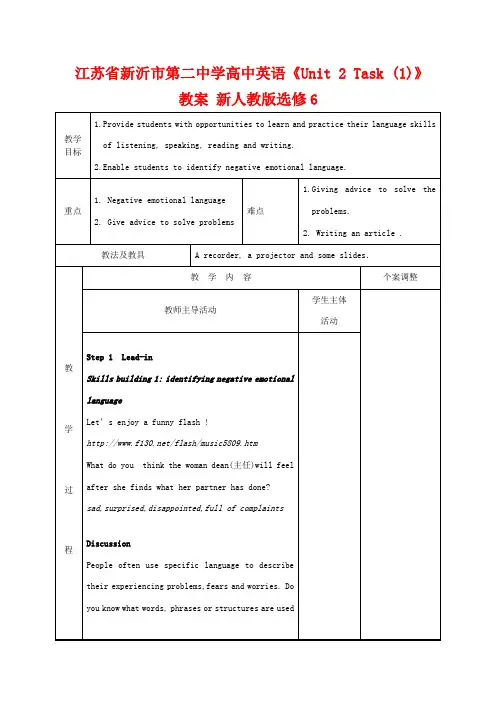
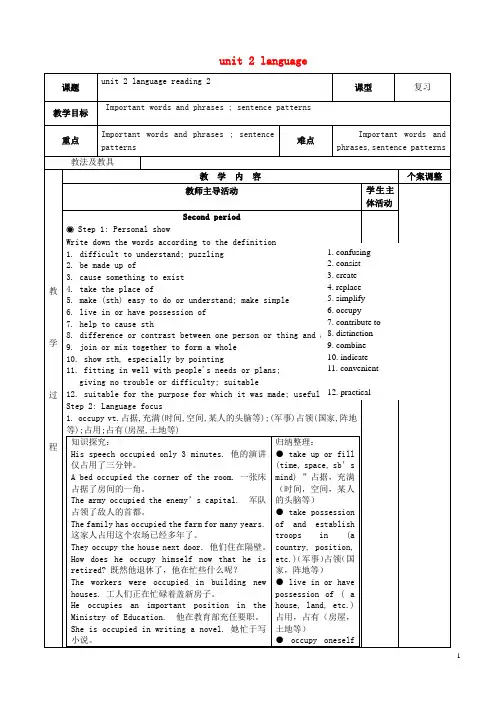
unit 2 language课题unit 2 language reading 2课型复习教学目标Important words and phrases ; sentence patterns重点Important words and phrases ; sentencepatterns难点Important words andphrases,sentence patterns教法及教具教学过程教学内容个案调整教师主导活动学生主体活动Second periodStep 1: Personal showWrite down the words according to the definition1. difficult to understand; puzzling2. be made up of3. cause something to exist4. take the place of5. make (sth) easy to do or understand; make simple6. live in or have possession of7. help to cause sth8. difference or contrast between one person or thing and another9. join or mix together to form a whole10. show sth, especially by pointing11. fitting in well with people's needs or plans;giving no trouble or difficulty; suitable12. suitable for the purpose for which it was made; usefulStep 2: Language focus1. occupy vt.占据,充满(时间,空间,某人的头脑等);(军事)占领(国家,阵地等);占用;占有(房屋,土地等)知识探究:His speech occupied only 3 minutes. 他的演讲仅占用了三分钟。
Unit 2 Spo rtin课题Unit 2 Spo rting events课型复习课教学目标明确学习的目标,掌握重点单词、短语、句型重点掌握重点单词、短语难点重点句型教法讲授法、讨论法、探究法教学过程教学内容个案调整教师主导活动学生主体活动Second periodStep 1: Personal showWrite down the words according to yourself.Step 2: Language focus◆ 1. honor知识探究:The event is in memory of the heroes. 这一活动是为了纪念那些英雄的。
They went to the forest in search of the murderer. 他他他他他他他他他他他他他He is in charge of the project.他负责这项工程。
I feel it an honor to be invited to speak here. (=I feel honored to beinvited to speak here.) 能应邀在这里讲话,我倍感荣幸。
归纳整理:1) vt.他他;他他他他他他;他他他他他;他他他他be honored for他……他他他;他……他他他他feel honored for他他他他honor sb. / sth. (with sth. )他他他他他他他他他他他他他)sb. be / feel honored to do sth. / that clause (他他他)他他他他2) n.尊敬,敬重;他他;他他;他他;他他; [C]他他他他;他他他他show honor to sb.他他他他他他他in honor of (他他)他…他他他他; 他他他…; 他他他a point of honor他他他他他他do sb. an honor /do sb. the honor (of doing sth. )他他他他他……;他他他他他他feel it an honor to do sth.他他他……他他他他他It is an honor for sb. to do s th. 他他他他他他……他他他他他他on one's honor他他他他他;他他他他have the honor of sth.他他他他他他;他他他他他他他他他in one's honor他他他他他他他他in honor of 为了向…他他他他;为了纪念;他…他他他题练落实:A) 1. Washington, a state in the United States, was named ______ one ofthe greatest American presidents.A. in honor ofB. instead ofC. in favor ofD. by means ofC) 2. While in London, we paid a visit to the hospital founded in _______of the nurse Florence Nightingale.A. needB. favorC. honorD. placeA) 3. The President ______ them with his visit.A. honoredB. in honor ofC. have the honor ofD. honor◆ 2. bring back 带回,归还,恢复;使回忆起知识探究:1) The old photograph brought back many memories. 这张旧照片引起许多回忆。
Unit2 Wish you were here课题Unit2 Wish you were here课型复习课教学目标明确学习的目标,把握考点, 重点句型重点重点单词短语难点重点句型教法讲授法、讨论法、探究法教学过程教学内容个案调整教师主导活动学生主体活动Step 1: Personal showWrite down the words according to the definition1. make somebody frightened2. in total3. something that protects you from attack4. a dark and cool area out of sun5. greater or better than usual6. before something happens7. amazing8. not comfortable9. having large and dangerous waves10. having something as part of group11. things such as food, medicines, etc. that neededby a group of people12. particular place or area13. move around in an area or go from place to place withoutany special purpose or destination14. programme of work to be done or of planned events15. make a visible image of sb /sth; show or suggestStep 2: Language focus◆ 1. whatever pron. &.adj.无论什么,无论何事知识探究:Whatever happens, keep calm. (=No matter what happens, keep calm.)无论发生什么事,都要保持冷静。
江苏省新沂市第二中学高中英语《Unit 2 Reading (3)》教案新人教版必修5教学目标understand the two passages betterLearn the language points in the two letters重点Master the language points 难点How to use the language points 教法及教具教学过程教学内容个案调整教师主导活动学生主体活动Step 1 RevisionLead the students to review the two letters byanswering some questions.Step2 Language points1. A recent announcement by scientists that theyhave successfully cloned the first humanannouncement (n.) 宣告,通知,声明make/ issue an announcem ent 发表声明announce(vt.)宣告,通知,声明announce sth. to sb.比较:announce/ declareannounce 指对公众或特定的一群关心的人进行宣布;declare指官方的正式宣告e.g.:1)Everyone was silent as he announced the winnerof the competition.2)This powerful country declared war on thatsmall country.2. On the one hand, some scientists point out thatif you clone an embryo, you can …1)on (the) one hand…on the other hand…一方面…另一方面…(单独使用on the other hand时,hand不能省略,但与on the one hand连用时,可省略)On one hand, rapid development of the economy willimprove the living conditions of the people. On the other hand, it will speed up environmental destruction.at hand (在手边,在附近) by hand (亲手,手工)in hand (手头现有的,正在进行,在处理中)hand in hand(手拉手)2)point out (指出)He pointed out my mistake. 他指出我的错误。
百度文库- 让每个人平等地提升自我Unit 2 Wish you were here单元视窗Wordlistadventure[ədˈventʃə] n.冒险,冒险经历arrange [əˈreindʒ] vt. & vi. 安排extraordinary [ikˈstr ɔ:dinəri]adj. 不同寻常的flight [flait]n. 航班;空中航行camel [ˈkæməl]n.骆驼desert ['dezət] n. 沙漠[diˈzə:t] vt. 抛弃,舍弃dusty [ˈdʌsti]adj.尘土飞扬的,满是灰尘的shade[ʃeid]n. 阴凉处;背阴;树荫brilliant [ˈbriliənt] adj. 明亮的,鲜艳的flashlight ['flæʃlait]n. 手电筒altogether [ˌɔ:ltəˈgeðə]adv. 总共uncomfortable [ʌnˈkʌmftəb əl]adj. 不舒服的, 不自在的rough [rʌf]adj. 汹涌的;粗糙的;大概的white-water rafting n.白浪漂流,激浪漂流helmet [ˈhelmit]n.头盔life jacket救生衣protection [prəˈtekʃən]n.保护in case 万一backpack ['bækpæk]n. 背包advance[ədˈvɑ:ns] n. 前进;预先 vi. 前进,进步in advance 提前,进步supply[səˈplai] n.供给,补给νt.提供wildlife n. 野生动物;野生生物photograph[ˈfəutəgrɑ:f]n. 照片defence [diˈfens]n. 防御,保护scare [skɛə] νt.使恐惧,惊吓up close靠近地mount[maunt] n. 山,山峰tiring['taiəiŋ]adj.让人疲劳的,累人的atmosphere['ætməsfiə] n.空气,大气层African['æfrikən] adj.非洲的 n.非洲人afterwards [ˈɑ:ftəwədz]ad.以后,后来,然后sleeve [sli:v] n. 袖子cheek[tʃi:k] n. 脸颊tourism [ˈtuərizəm]n. 旅游业schedule[ˈʃedju:l] n.日程表,时间表, 进度表crane [krein] n. 鹤explore [ikˈsplɔ:]vt. & vi. 探索;勘探sunrise [ˈsʌnraiz] n日出view[vju:] vt. 观看,看待n. 景色,风景,观点heaven[ˈhevən] n. 天堂;天空mountaintop ['mauntintɔp]n. 山顶temple[ˈtempəl] n. 寺院bury[ˈberi] v. 埋葬,埋藏destination[ˌdestiˈneiʃən]n. 目的地cage[keidʒ] n. 笼子beauty [ˈbju:ti] n.美;美景;美人south-west n.西南方 adj.西南方的 adv.在西南方,向西南方highway n.公路,干道,交通要道classic[ˈklæsik] adj. 经典的n. 经典作品novel [ˈnɔvəl] n. (长篇)小说kingdom[ˈkiŋdəm] n.王国steep[sti:p] adj. 陡峭的;急剧的forever [fəˈrevə]adv.永远的officially [əˈfiʃəli] adv.官方地,正式地spot [spɔt]n.地点,场所tourist[ˈtuərist] spot旅游点publish [ˈpʌbliʃ] vt.出版announce[əˈnauns]vt.宣布,宣称tower [ˈtauə] νi.高耸,屹立:高高升起 n.塔,塔楼sunshine[ˈsʌnʃain]n. 阳光reflect [riˈflekt] vt.反射(声、光、热等),反映diamond [ˈdaiəmənd]n. 钻石,金刚石cattle[ˈkætl] n. 牛wander[ˈwɔndə] vi. & vt.漫游,游荡; 徘徊,漂泊surrounding[səˈraundiŋ]νt. 周围的,附近的harmony [ˈhɑ:məni]n. 和谐, 协调, 融洽endless[ˈendlis]adj.无穷无尽的, 没完没了的mild[maild] adj.平和的,温和的把你没有记牢的挑出来,好好滴记住哦!An adventure in Africa Focus 30th JuneDear Aihua,How are you? Sorry I haven't written for so long. I've been quite busyarranging my holiday with my older brother, Colin. Colin and I plan tospend a few weeks traveling before he goes to university. We're goingto visit so many exciting places and do lots of extraordinary things.We will go to Africa first. I can't wait! Have you been there?We leave London on 15th July, and we'll be taking a flight to Morocco,in northern Africa. We're going to ride camels through the Sahara Desert.It's the biggest desert in the world—about the size of the US! I expectit will be very hot, dry and dusty there. We'll be traveling by camel,with local guides, camping in tents and sleeping on the ground. I'veheard that, in the Sahara, there is no shade during the day, and thestars seem especially brilliant on clear nights. I’ll bring aflashlight with me so that I'll be able to see in the dark. Altogether,the trip will take six days. That means I'll have to sit on a camel foralmost a week—how uncomfortable! I hope my camel likes me!After the trip by camel, we're going to travel down the River Nile. We'llstart at Lake Victoria. A little way down the river from Lake Victoria,the water actually gets quite rough. So, we'll go white-water rafting.It's quite dangerous, but very exciting! You have to wear a helmet anda life jacket for protection, just in case you fall into the water.Then, we're going on a trip to see wild animals in Kenya. We'll livewith the local people in their villages, and eat and drink whatever theydo, including cow's blood! Do you think I should drink it?Since we'll be walking for almost two weeks, I'll need to buy a largebackpack in advance to carry my supplies of food and water. During theday, we'll walk across the land, following the tracks of wildlife suchas elephants, lions and giraffes. We'll try to get as close as possibleto the animals, even though they're dangerous, so that I can take somereally good photographs. But don't worry about me. Our guides will haveguns with them for defense—They can use the guns to scare the animalsaway if they come too near. I really want to see an elephant up close.Colin wants to see a giraffe.After that, we'll be moving on to Tanzania, where we're going to climbMount Kilimanjaro. Mountain climbing can be very tiring, and many peoplefeel sick as the atmosphere gets thinner, so Colin and I will make surethat we will get plenty of rest. The African part of our trip will takeabout four weeks. Afterwards, we're going to the Himalayas.I send you postcards from all the different places we visit!Love,TobyFirst periodListen and learn:Listen to the wordlist and try to learn the words and phrases by heart.◆Step 1:◆Step 2: Personal show●Task 1: Give the following words’ Chinese meaningadventure n. desert n. vt.shade n. uncomfortable adj.advance n. vi. supply n. νt.in advance defence n.schedule n. explore vt. & vi.view vt. n. classic adj. n.surrounding νt.officially adv.●Task 2: Translate the following wordsvt. & vi. 安排adj. 汹涌的;粗糙的;大概的n.保护n. 空气,大气层;氛围n. 目的地n.公路,干道,交通要道n.地点,场所vt. 反射(声、光、热等),反映vi. & vt. 漫游,游荡; 徘徊,漂泊n. 和谐, 协调, 融洽adj.无穷无尽的, 没完没了的adj.平和的,温和的Step 3: Text reading Listen to the text and then finish the following sentences●Task 1: Fill in the blanks according to the text1. I've been quite busy ________ (安排) my holiday with my older brother, Colin.2. You have to wear a helmet and a life jacket _______(作为保护), just ______ (以防,以免)you fall into the water.3. We'll live with the local people in their villages, and eat and drink _______(他们吃喝的任何东西) , ________ (包括) cow's blood!4. Since we'll be walking for almost two weeks, I'll need to buy a large backpack _______ (事先) ____________ (来装我的供给品食物和水).5. We'll try to get ____________ (尽可能近地) to the animals, even though they're dangerous, ______(以便) I can take some really good photographs.6. Our guides will have guns with them __________ (作为防护).7. Mountain climbing ______ (可能) be very tiring, and many people feel sick ________ (随着空气变得稀薄) .●Task 2: Task-based reading阅读课文, 完成下表。
Unit 2 Language单元视窗Wordlistbe made up of由组成,由…构成vocabulary [vəˈkæbjuləri] n.词汇nowadays [ˈnauədeiz] adv.现今,现在* Celtic [ˈkeltik] n.凯尔特语Germanic [dʒə: ˈmænik] adj.日尔曼民族的mainland [ˈmeinlənd] n.大陆*Angel [ˈæŋgl]n. 盎格鲁人*Saxon [ˈsæksn] n. 撒克逊人occupy [ˈɔkjupai] vt.占,占用,占领;使忙碌,使从事consist [kənˈsist] vi组成,构成consist of由…..组成,由…构成mixture [ˈmikstʃə] n.混合;混合物name after 以…命名aside[əˈsaid]ad.除…之外,在旁边aside from 除…之外* Viking [ˈvaikiŋ] n.维京人.北欧海盗official [əˈfiʃəl] adj.官方的,正式的phrase [freiz] n.词组,短语contribution [ˌkɔntriˈbju:ʃən] n.贡献,促成因素;捐款*Norman [ˈnɔːmən] n.诺曼人adj.诺曼的;诺曼人的defeat [diˈfi:t] vt.击败,战胜take control of控制,取得对……的控制* the Norman Conquest [ˈkɔŋkwest] 诺曼征服(诺曼人对英格兰人的军事征服)lead to 导致replace [ri(:)ˈpleis] vt 替换,代替,取代entire [inˈtaiə] a.全部的,整个的servant [ˈsə:vənt] n.仆人raise [reiz] vt.养育,培养,举起,增加,提高,筹募,提及therefore [ˈðeəfɔ:] ad.因此,所以mutton [ˈmʌtn] n.羊肉bacon [ˈbeikən] n.熏猪肉,咸猪肉* plural [ˈpluərəl] adj.复数的high-class adj.上层社会的mother tongue母语,本国语* the Renaissance [ˌriˈneisns] n.(欧洲) 文艺复兴*Latin [ˈlætin] adj. 拉丁语的n. 拉丁语Greek [gri:k] adj. 希腊语的,希腊人的,希腊的n. 希腊语,希腊人process [ˈprəuses] n. 过程;进程distinction [diˈstiŋkʃən]n.差别;区别spelling [ˈspeliŋ] n.拼写,拼法accent [ˈæksənt] n.口音,腔调,着重点concern [kənˈsə:n] n.关切;忧虑vt.涉及;使…担心,对…感兴趣ban [bæn]vt. & n.禁止,取缔,禁令pure [pjuə] adj. 纯的,纯洁的,纯粹的unique [ju:ˈni:k] a. 独特的;极不寻常的access [ˈækses] vt. 进入,使用n. 通道, (使用的)机会,权利character [ˈkæriktə] n.(书写或印刷)文字,角色;符号,性格bark [bɑ:k] vi.(狗等)吠,叫n.吠声racial [ˈreiʃəl] adj.种族的gentle [ˈdʒentl] a.温柔的;平和的embarrass [imˈbærəs] vt.使难堪,使尴尬backwards [ˈbækwədz] ad.向后 a.向反方向的conclusion [kənˈklu:ʒən] n.结论,推论custom [ˈkʌstəm] n.习惯,风俗,惯例interrupt [ˌintəˈrʌpt] v.打断,插嘴,暂停mistaken [misˈteikən]adj. 错误的,误解的ought [ɔ:t] to modal v. 应当;应该differ vi.相异,有区别differ from和…不同,不同于alphabet [ˈælfəbet] n.字母表,全部字母stand for 代表,象征deed [di:d] n.行为,行动writing [ˈraitiŋ] n.文字,文学作品hunt [hʌnt]n. & v.打猎;猎杀,搜寻appearance [əˈpiərəns] n.出现;外观,外貌represent [ˌrepriˈzent]vt.代表;展示,描绘drawing [ˈdrɔ:iŋ] n.绘画;绘画艺术simplify [ˈsimplifai]νt. 简化as a whole 作为整体,总体上combine [kəmˈbain] νt.& νi.组合, (使)联合distinguish [diˈstiŋgwiʃ]vt.区分,辨别;使具有某种特征indicate [ˈindikeit] vt.显示,表示,象征,暗示shortcoming [ˈʃɔ:tkʌmiŋ]n.短处,缺点ink [iŋk] n.墨水,油墨eyesight [ˈaisait] n.视力press [pres] v. (被)压;挤,推,施加压力n. 报刊,新闻界;出版(通讯)社wire [ˈwaiə] n.金属丝,铁丝网convenient[kənˈvi:niənt]a.方便的battle [ˈbætl] n.战役(斗)pattern [ˈpætən] n. 图案,花纹,模式;方式drag [dræg] vt.拖,拉practical [ˈpræktikəl] a.实用的;(切实)可行的thus [ðʌs] ad.如此,以此方式;因此,从而typewriter [ˈtaipˌraitə] n.打字机version [ˈvə:ʃn] n.版本把你没有记牢的挑出来,好好滴记住哦!English and its history Focus All through history, people from many different countries andcultures have lived together in Britain. The English language is madeup of the grammar and vocabulary these people brought to Britain. Thatis why English has so many difficult rules that confuse people.Old EnglishOld English is very different from the English we speak nowadays.In fact, we would not be able to understand it if we heard it today.Before the middle of the 5th century, people in Britain all spoke alanguage called Celtic. Then two Germanic groups from the European mainland—the Angles and the Saxons—occupied Britain. Old English consisted of a mixture of their languages. (Both the English language and the English people are named after the Angles; the word Angle was spelt Engle in Old English.) Aside from place names such as London, very few Celtic words became part of Old English. At the end of the 9th century, the Vikings, people from Northern European countries such as Denmark and Norway, began to move to Britain. They brought with them their languages, which also mixed with Old English. By the 10th century, Old English had become the official language of England.When we speak English today, we sometimes feel puzzled about which words or phrases to use. This is because English has many words and phrases from different languages, but with similar meanings. For example, the word sick came from a word once used by the Angles and the Saxons, while ill came from a word once used by the Norwegians.Middle EnglishMiddle English is the name given to the English used from around the 12th to the 15th centuries. Many things played a part in the development of this new type of English. The most important contribution was from the Normans, a French-speaking people who defeated England and took control of the country in 1066. However, the Norman Conquest did not affect English as much as the Angles and the Saxons' victory about 600 years earlier, which led to Old English replacing Celtic. Even though the Normans spoke French for the entire 250 years they ruled England, French did not replace English as the first language. On the other hand, the English language did borrow many words from French. This resulted in even more words with similar meanings, such as answer (from Old English) and reply (from Old French). It is interesting to learn how the words for animals and meat developed. After the Norman Conquest, many English people worked as servants who raised animals. Therefore, the words we use for most animals raised for food, such as cow, sheep and pig, came from Old English. However, the words for the meat of these animals, which was served to the Normans, came from Old French: beef, mutton, pork and bacon.Old French made other contributions to Middle English as well. In 1. occupy2. consist3. contributi onOld English, the Germanic way of making words plural was used. For example, they said housen instead of houses, and shoen instead of shoes. After the Normans took control, they began using the French way of making plurals, adding an -s to house and shoe. Only a few words kept their Germanic plural forms, such as man/ men and child/ children.After the Norman Conquest, high-class people spoke French while common people spoke English. However, by the latter half of the 14th century, English had come into widespread use among all classes in England. In 1399, Henry IV became King of England. His mother tongue was English, and he used English for all official events.Modern EnglishModern English appeared during the Renaissance in the 16th century. Because of this, Modern English includes many Latin and Greek words. Pronunciation also went through huge changes during this period. Of course, this was not the end of the changes in the English language. The question of whether English will keep on changing in the future is easy to answer. It is certain that this process will continue, and people will keep inventing new words and new ways of saying things.First periodListen and learn:Listen to the wordlist and try to learn the words and phrases by heart.◆Step 1:◆Step 2: Personal show●Task 1: Give the following words’ Chinese meaningoccupy vt. consist viname after contribution n.defeat vt. take control oflead to replace vtraise vt. embarrass vt.concern n. vt. differ fromstand for appearance n.simplify νt. as a wholeshortcoming n. version n.●Task 2: Translate the following wordsn. 过程;进程n.差别;区别adj. 纯的,纯洁的,纯粹的 a. 独特的;极不寻常的vt. 进入,使用n. 通道, (使用的)机会,权利 a.温柔的;平和的n. (书写或印刷)文字,角色;符号,性格n.结论,推论n.习惯,风俗,惯例adj. 错误的,误解的vt.代表;展示,描绘νt. & νi.组合, (使)联合vt. 显示,表示,象征,暗示 a. 方便的a.实用的;(切实)可行的ad.因此,所以Step 3: Text reading Listen to the text and then finish the following sentences●Task 1: Fill in the blanks according to the text1. That is why English has so many difficult rules _________(让人迷惑的).2. Old English __________ (包含) a mixture of their languages.3. _________ (除了) place names such as London, very few Celtic words __________ (成为的部分) Old English.4. When we speak English today, we sometimes _____________ (感到迷惑) which words or phrases to use.5. Many things _______ (起到作用) the development of this new type of English.6. ________(尽管) the Normans spoke French for the entire 250 years they ruled England, French did not ______ English ______ (取代…作为) the first language.7. Old French _____ other ________(对产生了促进作用) Middle English as well.8. __________ (可以肯定的是) that this process will continue, and people will keep inventing new words and new ways of saying things. ●Task 2: Task-based reading 阅读课文, 完成下表。